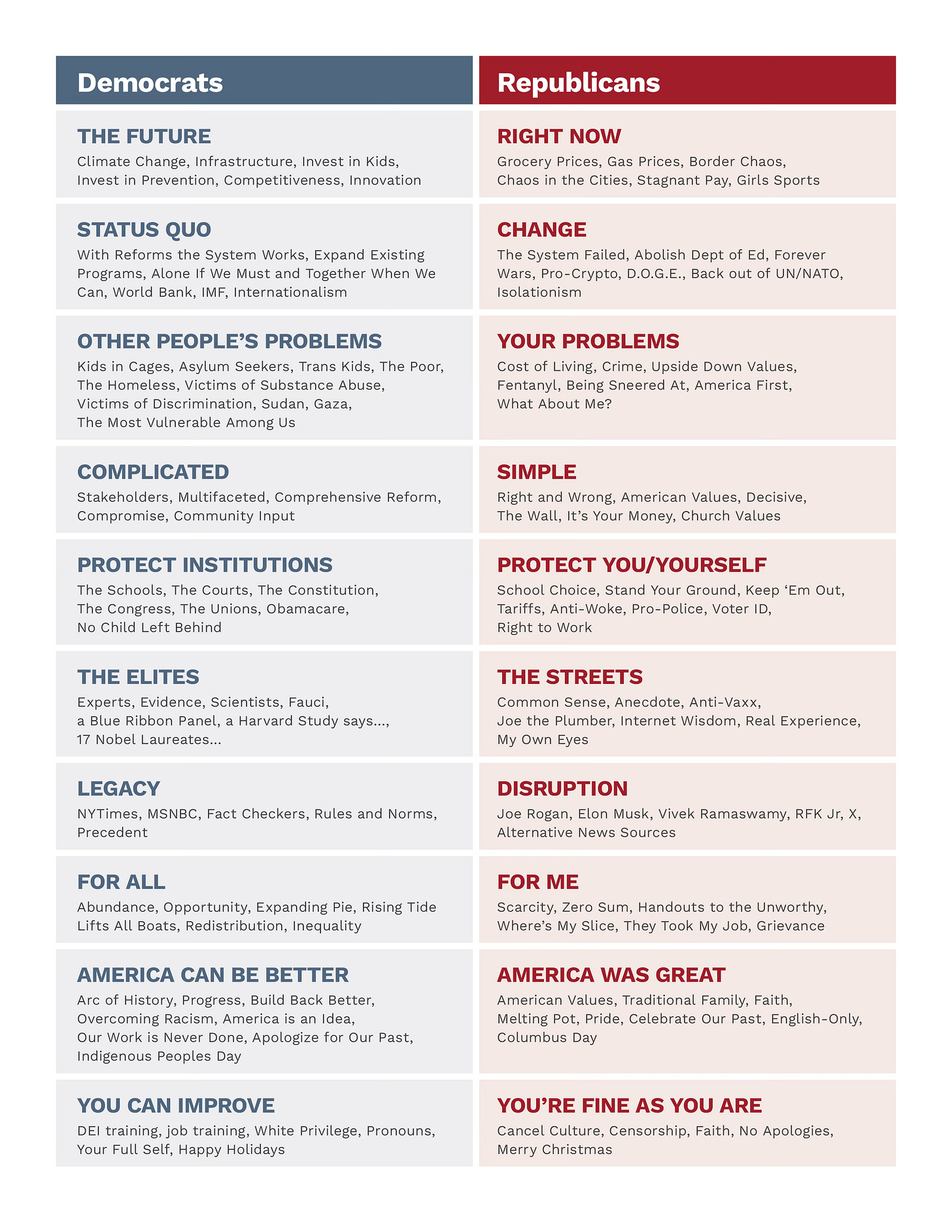Too much of a good thing
How Polarities Explain Democrats’ Demise and Path Back
Today’s guest post is from Jim Kessler, Third Way co-founder and Executive VP for Policy.
I am active to a fault. I work out intensely, bike to work, and obsess over my steps. I don’t sleep very much, because I’ll rest when I’m dead, to paraphrase Warren Zevon. I’m also 64 and my knees and shoulders ache. I may be fit; I may be killing myself – I can argue both ways.
Activity and rest is a classic polarity. Two positive but opposing attributes, each essential to success and each leading to calamity if one is overdone at the expense of the other. Cutting edge companies and organizations employ polarities thinking to maximize their success. Polarities can be simple (like activity and rest) or complicated with the need for balance truly in tension.
Political NGOs like mine must balance building alliances with disrupting unhelpful paradigms. Companies often face a choice between short-term profit or long-term growth. Military leaders must balance training and preparation with ensuring they have enough manpower in the field. Each end of the polarity is essential, and each will lead to failure through stasis or chaos when overcooked.
After the Democrats’ latest electoral calamity, I conducted my own exercise in polarities thinking and reflected on some seemingly positive attributes that, when overplayed, did us harm. On the opposite side of each polarity is a recognizable Republican attribute – not a caricature of Trump Republicanism (as tempting as that was), but one that gives them the benefit of the doubt by portraying it the way a GOP supporter might describe it to a friend.
The exercise was illuminating and affirming. It allowed me to acknowledge pride in a political party that says, “I don’t care if it’s unpopular, we are going to protect the most vulnerable people in America no matter how uncomfortable it gets.”
It also gave me room to accept that it is human nature when others ask, “that’s fine, but when are you going to think about me?”
Below are ten polarities that impacted the 2024 outcome. For each, Democrats leaned so fully into their muscle memory that it led to perceptions of extremism or being out of touch, either ideologically or attitudinally. For example, Democrats have always been the party of the future, with climate change a seminal example. That’s good! But not if we overdo it and forfeit a focus on the here and now, in a moment when gas prices and cost of living stood front and center.
The good news is that Trump and Republicans will vastly overplay their side of the polarity, which will threaten their future electoral prospects. But if Democrats are to achieve long-term electoral success, they will need to recognize that too much virtue can be a vice. Because as we have seen to our extreme detriment, the road to defeat is paved with good intentions run amok.



I would add "All Government is Good vs All Government is Bad". I think we Democrats need to educate ourselves on the unintended consequences of more govt (both size and regulatory power -- the studies on environmental regulation employed to block positive environmentally beneficial projects is just one example) and take a moment to consider that even if the intent of additional government is good that there is something inherently flawed with government (because humans are flawed). This requires humility which seems to be in short supply among NGO's and among camera seeking electeds.
Do these come from a survey or is it just a brainstorming exercise?
Are "Competitiveness" and "Innovation" more D than R? Same with "Rising Tides"?
"Status Quo" and "American can be Better" seem a bit at odds? Biden was the president and Harris the VP during the election but are Dems usually the "Status Quo" party?
"Internationalism" and "Isolationism" seem to fit better in the box below them.
Both "Pro-Police" and "Voter ID" seem more in line with protecting institutions. Voter ID as protecting yourself seems odd.